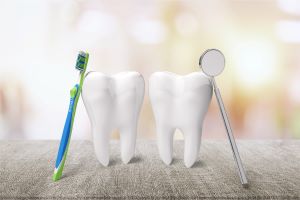Understanding Dental Care for Diabetes

What does oral health have in common with diabetes? A lot when you consider that high blood sugar can affect your entire body including your teeth and gums.
Diabetes, when uncontrolled, compromises white blood cell functionality. Because white blood cells are the body’s main defense against bacterial infections in the mouth, this makes understanding dental care for diabetes imperative.
Dental Health Risks for Individuals with Diabetes
If you have diabetes and do not control the condition through diet, exercise, and/or medication, you’re at increased risk for several oral health problems:
- Dry Mouth — Diabetes decreases saliva flow, which can lead to common issues like tooth decay, infections, soreness, and ulcers.
- Gum Inflammation — Diabetes causes blood vessels to thicken, slowing the transfer of nutrients to and wastes from the mouth. This reduces the body’s ability to fight infections and can also cause gum disease.
- Poor Healing — Following a procedure or oral surgery, those with diabetes will heal more slowly due to reduced blood flow to the treatment site.
- Thrush — Individuals who regularly take antibiotics to fight infections are prone to developing thrush, a fungal infection of the mouth and tongue. Once present, it thrives on heightened levels of sugar present in the saliva of those with uncontrolled diabetes.
Dental Care Tips for Those with Diabetes
It’s vital to monitor your oral health closely if you have diabetes because small changes can signal more serious problems. There are things you can do to protect against the common dental health risks mentioned above:
- Keep Your Mouth Clean — Brush your teeth with a soft bristled toothbrush about 30 minutes after eating. This allows enamel to remineralize after being contacted by acid in food. You should also floss at least once daily and rinse with an antibacterial mouth rinse.
- Use Dental Appliances Carefully — If you wear dental appliances like retainers or dentures, you should remove them, clean them daily, and never sleep in them.
- Maintain Normal Blood Sugar Levels — Many oral health problems including tooth decay, gum disease, and thrush are caused by excess sugars in saliva, making it important to maintain normal blood sugar levels.
- Visit Your Doctor Before Major Procedures — If you have a major dental procedure planned, it’s important to first visit your doctor to determine if you will require pre-surgical antibiotics and/or need to adjust your eating habits or insulin schedule beforehand.
- Keep Your Dentist Informed — Be sure to tell your dentist your HgA1C level so he or she is aware of how controlled your diabetes is. You should also share if you’ve had any hypoglycemic episodes and when you took your last dose of insulin to help your dentist identify potential oral health risks.
- Provide Your Dentist With Your Medications — Make sure your dentist is aware of your current medications. This way, if anything else needs to be prescribed, he or she can make sure it doesn’t interfere with what you are currently taking.
Preventative Care Protects Your Oral (and General) Health
If you have diabetes, you can never be too careful with the measures you take to protect yourself from infection, especially of the mouth.
By taking the tips above into consideration, you can reduce the likelihood of being affected by one of the many dental health risks unique to those with diabetes. Doing so will be beneficial not only for your teeth and gums, but for your holistic health as well.
Sources:
Dental Care and Diabetes. (2014, May 22). Retrieved on June 3, 2015 from http://www.webmd.com/diabetes/dental-health-dental-care-diabetes
Diabetes and Dental Care: Guide to a Healthy Mouth. (2012, November 7). Retrieved June 3, 2015 from http://www.mayoclinic.org/diseases-conditions/diabetes/in-depth/diabetes/art-20043848